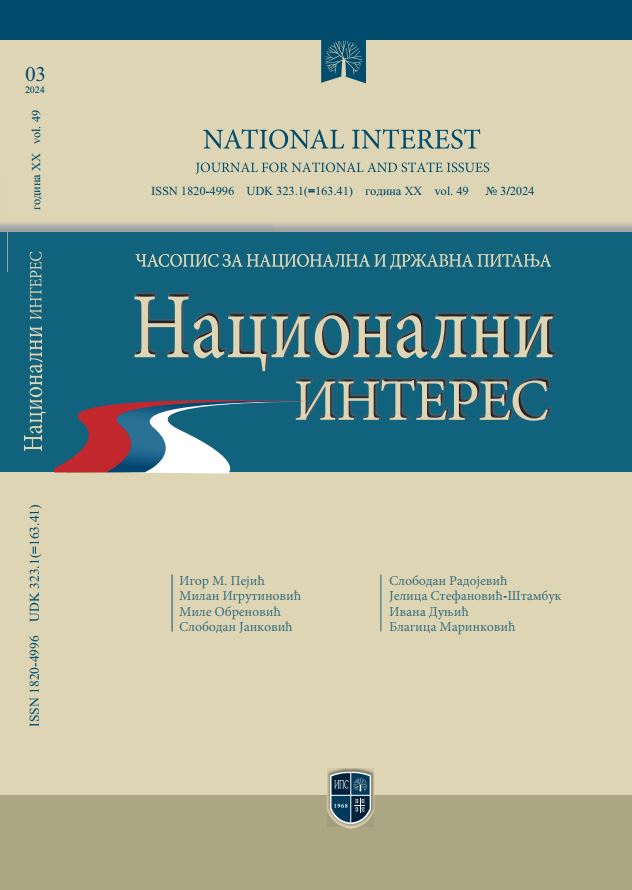GERMANY'S (UN)SUCCESS IN IMPLEMENTING THE AMERICAN STRATEGY OF EXTENDED DETTERENCE AGAINST RUSSIA
Abstract
Considering the relationship between Germany and the United States through Lake's theory of international hierarchies, it becomes apparent that Germany occupies a subordinate position within the security domain, which is at the very end of the hierarchical spectrum. At the core of this relationship is an "exchange": security for sovereignty, meaning that Germany delegates the responsibility for its security to the U.S. but is obligated to align its security policy with American policy, thereby losing part of its sovereignty.With the onset of the Russo-Ukrainian war in 2022, the U.S. opted for a strategy of extended deterrence against Russia, and Germany, as this hierarchical relationship suggests, aligned its defense policy with that of the U.S. and accepted its role in the American strategy of extended deterrence. Although Germany has played a significant role in U.S. efforts to deter Russia since the beginning of the war, the question arises as to whether the application of this strategy in the case of Germany has been successful. For a strategy to be considered successful, it must be both efficient and effective. The main hypothesis is that as time passes and the war progresses, Germany's implementation of the strategy of extended deterrence is becoming evident as both ineffective and inefficient. To address the central research question, the paper is divided into three chapters. The first analyzes the relationship between Germany and the U.S. through Lake's theory of international hierarchies, focusing on what this relationship means for Germany. The second examines why Germany initially believed in the success of the strategy of extended deterrence against Russia and how the U.S. contributed to that belief. Finally, the third chapter analyzes the effectiveness and efficiency of Germany's application of the strategy of extended deterrence.
References
Благојевић, Вељко. 2023. „Дипломатија Србије у одвраћању.” Српска политичка мисао 81 (3): 165-185. doi: https://doi.org/10.5937/spm81-45308
Благојевић, Вељко и Тихомир Радановић. 2022. „Стратешко одвраћање: кључне надлежности државних органа Републике Србије.” Војно дело 74 (4): 28-39. doi: 10.5937/vojdelo2204028B
Копања, Михајло. 2022. „Геополитички приступ утврђивању делотворности концепта велике стратегије обуздавања (Студија случаја: Сједињене Америчке Државе, 1979 - 1989).” Докторска дисертација. Универзитет у Београду: Факултет безбедности.
Копања, Михајло. 2023. „Ефективност одвраћања: када је одвраћање „права” стратегија за остваривање националних интереса?” Српска политичка мисао 80 (2): 75-96. doi: 10.5937/spm80-44241
Копања, Михајло и Владимир Ајзенхамер. 2022. „Одвраћање у раљама безбедносне дилеме.“. У Неутралност и стратешко одвраћање, ур. Вељко Благојевић, 15-38. Београд: Медија центар „Одбрана”.
Ajzenhamer, Vladimir. 2019. „Uloga međunarodnog autoriteta u Lejkovoj hijarahizovanoj „shemi “svetske politike.” Međunarodni problemi 71 (3): 311-334.
Deutsche Welle [DW]. 2024. „German defense minister says military budget gap 'annoying'. Deustche Welle. https://www.dw.com/en/german-defense-minister-says-military-budget-gap-annoying/a-69592452.
Drucker, Peter F. 2009. Management: Revised Edition. New York: HarperCollins e-books.
Frank, Dorothee. 2024. „Start der deutschen Panzerbrigade 45 in Litauen.” Defence Network. https://defence-network.com/start-der-panzerbrigade-45-in-litauen/.
European Commision. 2024. „In-Depth Review 2024: Germany.” Institutional Paper 280. https://economy-finance.ec.europa.eu/document/download/752252ba-32c9-4537-858b-347ee47a2928_en?filename=ip280_en_UPD.pdf.
German National Security Strategy. 2023. „Robust. Resilient. Sustainable. Integrated Security for Germany.”
Global Firepower. n.d. „Comparison of Russia and Germany Military Strengths (2024).” Global Firepower. https://www.globalfirepower.com/countries-comparison-detail.php?form=form&country1=russia&country2=germany&Submit=COMPAR, last accessed 15 September 2024.
Haftendorn, Helga. 2005. „Germany’s accession to NATO: 50 years on.” NATO Review. https://www.nato.int/docu/review/articles/2005/06/01/germanys-accession-to-nato-50-years-on/index.html.
Helwig, Niklas. 2020. „Out of order? The US alliance in Germany’s foreign and security policy.” Contemporary Politics 26 (4): 439-457. doi: 10.1080/13569775.2020.1777039
Knight, Ben. 2019. „US-Soldaten in Deutschland: Zahlen und Fakten”. Deutsche Welle. https://www.dw.com/de/die-us-armee-in-deutschland-zahlen-und-fakten/a-50151636.
Knight, Ben. 2024. „US military in Germany: What you need to know?” Detusche Welle. https://www.dw.com/en/us-military-in-germany-what-you-need-to-know/a-49998340.
Kostić-Šulejić, Marina. 2023. „Zeitenwende and the German National Security Policy: Analysis of the First National Security Strategy.” The Review of International Affairs 74 (1188): 79-105. doi: 10.18485/iipe_ria.2023.74.1188.4
Krstić, Bojan i Vesna Sekulić. 2007. Upravljanje performansama preduzeća. Niš: Ekonomski fakultet
Kundnani, Hans. 2022. The United States in German Foreign Policy. Policy Brief No. 119. Washington D.C.: The German Marshall Fund of the United States.
Lake, David A. 2009. Hierarchy in International Relations. Ithaca and London: Cornell University.
Marsh, Sarah. 2024. „Germany proposes new selective military service to boost defence.” Reuters. https://www.reuters.com/world/europe/germany-proposes-new-voluntary-military-service-boost-defence-2024-06-12/.
Mazzar, Michael. 2023. „Understanding Deterrence.” RAND. https://www.rand.org/pubs/perspectives/PE295.html.
Morii,Yuichi. 2017. „Germany’s Changing Perception and its Role in the Alliance - The NATO Warsaw Summit and its Implications”. https://www.spf.org/projects/upload/Germany%E2%80%99s%20Changing%20Perception%20and%20its%20Role%20in%20the%20Alliance%20%28Morii%29.pdf, last accessed 20. September 2024.
O'Dell, Hope. 2023. „The US is sending more troops to the Middle East. Where in the world are US military deployed?” Bluemarble. https://globalaffairs.org/bluemarble/us-sending-more-troops-middle-east-where-world-are-us-military-deployed.
Roščić, Dijana. 2024. „U Nemačkoj uskoro ponovo rakete iz SAD koje dosežu do Rusije.” Deutsche Welle. https://www.dw.com/sr/ameri%C4%8Dke-dalekometne-krstare%C4%87e-rakete-ponovo-u-nema%C4%8Dkoj/a-69638714.
Schmidt, Siegmar. 2005. Germany-the reluctant ally: German domestic politics, the US and the war against Saddam Hussein. Pittsburgh PA: Matthew B. Ridgway Center for International Security Studies.
Scholz, Olaf. 2022. „Resolutely committed to peace and security. Policy statement by Olaf Scholz, Chancellor of the Federal Republic of Germany and Member of the German Bundestag“. https://www.bundesregierung.de/breg-en/news/policy-statement-by-olaf-scholz-chancellor-of-the-federal-republic-of-germany-and-member-of-the-german-bundestag-27-february-2022-in-berlin-2008378.
Statista. 2024. „German defense spending in absolute terms and share of GDP 2005-2021.” Statista. https://www.statista.com/statistics/1394337/eu-military-defense-german-defense-spending-absolute-gdp/.
Veselinović, Milan, Jelena Dimovski i Marko Janković. 2023. „Složenost nabavke gasa u EU izazvana ratom u Ukrajini.” Ekonomika 69 (4): 97-110.
Wachs, Lydia. 2023. „Russian Missiles and the European Sky Shield Initiative: German plans to strengthen air and missile defence in the current threat environment.” SWP Comment No. 45.
Witting, Volker and Rina Goldenberg. 2024. „Germany and nuclear weapons: A difficult history.” Deutsche Welle. https://www.dw.com/en/germany-and-nuclear-weapons-a-difficult-history/a-68279838.
World Bank Group. n.d. „Military expenditure (% of GDP).” World Bank Group. https://data.worldbank.org/indicator/MS.MIL.XPND.GD.ZS?locations=RU, last accessed 12. September 2024.
Zandee, Dick and Davis Ellison. 2024. Germany’s Zeitenwende and the consequences for German-Dutch defence cooperation. The Hague: Clingendael Netherlands Institute of International Relations and The Hague Centre for Strategic Studies.

